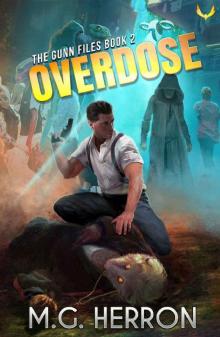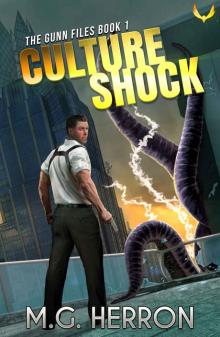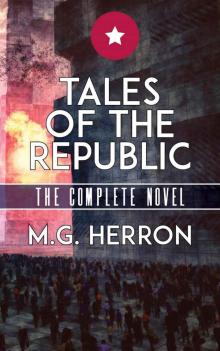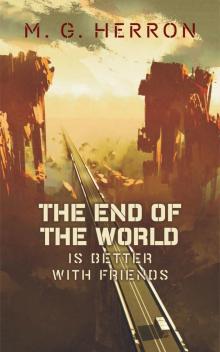- Home
- M. G. Herron
Tales of the Republic (The Complete Novel) Page 2
Tales of the Republic (The Complete Novel) Read online
Page 2
Ming shook his head to clear it of these distracting thoughts and focused on the present. The rice seeds were almost ready to enter trial.
Almost.
“If we make good time, we can get the seeds back to Congress by tonight. I can’t get around the committee review, but I need to do everything I can to speed up the process.” Those rice seeds could save lives.
Ari nodded and depressed the accelerator.
The early-morning sunlight slanted off the polished high-rise glass and steel office buildings near the Fields prefecture. Those fell behind and the vehicle bore them across an ocean of apartment buildings, brick townhouses, smaller wooden houses, row tenements, impossibly tall cement project buildings, and, finally, the endless clusters of patched sheet metal and wood shanty towns that sprawled west to the edge of King Valley.
Despite the hour, they were forced to avoid activist-occupied intersections. Lines of people marched back and forth across the road, hefting signs condemning the government, demanding relief and reduced food prices, while men and women with bandannas tied over their faces hurled stones at the car. Now that the pressure of the rationing could be felt again, encounters like this were common. People reacted different ways to that kind of pain and fear. These people protested. Ari drove. Ming thought about the rice seeds.
They turned a corner and encountered another set of protestors. He admired Ari’s composure as the car whipped into a tight U-turn, but flinched when a heavy rock bounced off the roof over his head. The protestors slipped from sight when the car swung around a corner.
Ming expected trouble for the rest of the drive, yet the road remained clear. They reached Greyhare Market by mid-morning. Ming didn’t realize he was holding his breath until he exhaled heavily with surprise.
The square normally swarmed with people. Today, it was deserted.
“This is weird,” Ming said. “Where is everyone?”
“At the protests,” Ari said. “Or hiding from them.”
“Lucky for us. This is usually the worst part of the drive.”
“Yeah,” Ari said, gazing warily ahead of them. “Lucky for us.”
Ming grunted his agreement. He didn’t trust the convenience of it, either.
They drove on for another hour. The slums fell away abruptly and the electric sedan punched into an open space, like a train coming out of a tunnel. A government-protected strip of grass and mud several hundred yards wide led to the deep gorge of the Enshi River, the natural barrier separating the sprawling city of Enshi from King Valley.
A group of protestors gathered at the near end of the bridge. Ari drove slowly through an opening in the small crowd, and though they pounded and shouted and pushed on the car, it was not enough to hold them. Ming held his seatbelt tight but didn’t shy from the angry gazes of the protestors who hollered and spit at his window.
“If only they knew,” Ming said. But it wasn’t safe for most people to know about the rice seeds.
“I believe in you, sir,” Ari said. “If it’s any consolation.”
“Thanks, Ari.”
The protestors fell away and Ari took the car across the gorge on an elegant suspension bridge whose cables had been engineered to resemble a soaring double-helix. White and black strands entwined the road, over and under the half-mile bridge. Six triangular pairs of legs supported the road, their columns diving into the muddy river below.
A calcium-white line along the shore twenty feet above the surface of the slow-moving river was a dry reminder of how unseasonably low the water flowed. Even at low water, the deep river was an impressive sight. The car bumped as the tires of the electric sedan rolled over the joists at the middle section of the bridge, where the roadway would part if the bridge were raised. Ming didn’t think the drawbridge had been used all season.
Ari eased his foot off the throttle as he approached the checkpoint at the opposite side of the gorge. It looked like a toll booth made of shining metal. They were waved aside by a cadre of armed guards. Twenty men wearing full riot gear and with machine guns slung over their shoulders stood every few yards across the length of the bridge. One helmeted guard, the man nearest the car, snapped up the plastic visor covering his face as they came near.
“ID, please.”
“Captain Wallace,” Ming said as he handed over the card. “It’s good to see you here. Did you get reassigned again?”
Ming held still while the captain ran a security scan using the microchip implanted in his left eye. The device relayed the information on Ming’s card, plus a scan of his face, back to a central processing server.
Wallace nodded. “We’re short on men, so they had no choice but to give me back the Valley.”
“No kidding.”
“Yes, sir.”
“A new command. Day shifts. Sounds like a promotion to me.”
“Night shifts, too, if you can believe it. I haven’t slept in twenty-four hours. We cornered a group of rebels in King Valley last night, about ten miles north of here. They crossed upriver and hiked in the long way. Must have taken the better part of a week.”
That was near Ben’s property. A cold shiver ran down Ming’s spine. Urban sprawl in the Republic was like a wasting disease that consumed any piece of land it touched. As people sprawled, farmland receded, and each year fewer farms provided the food needed to sustain the region’s burgeoning population. If the rebels managed to breach the gate into King Valley…
“Citizen?” Ming asked.
The court never pinned Magistrate Alber’s murder on a specific person, but it was widely known who was responsible. Citizen. An arrogant moniker. As if they alone were the voice of the people.
Captain Wallace bobbed his head from side to side. “Probably. They aren’t talking yet.”
“Did anyone get hurt?”
“No, thank God. They seemed to be scouting the area.”
“That’s not encouraging.” Ming paused. Then he asked, “Does Senator Khan know?”
The Agricultural Committee, with Senator Khan in charge, would have his ass if something happened to Ben’s research.
“I filed my report this morning. With the chief of police.” Captain Wallace regarded Ming with flat eyes that told him how seriously he took his job. Unfortunately, after what happened last year, Wallace also played it strictly by the book.
Ming smiled, trying to hide his disappointment. If the chief knew, then Khan knew, too. The senior senator had eyes and ears everywhere. “You did the right thing, Captain.”
Ming caught Ari’s blue eyes in the rearview mirror and looked away. Senator Khan’s characteristic, exaggerated TV-voice yammered on in his head like a devil on his shoulder, as if incarcerating those who disagreed with them and building a giant wall on their northern border to keep out the refugees would solve their problems.
Wallace must have been thinking along the same lines. “You ask me, wherever they come from and whatever they call themselves, those people broke the law and deserve to be locked up. An escort is on its way to take them downtown. Here’s your card, sir.”
Ming took his ID back without another word.
Ari left the engine running, got out of the car, and opened the back door for Ming. They stood together and watched as another officer climbed into the driver’s seat and guided their car onto a conveyor belt, which carried it into a giant plastic tube. The rounded, transparent walls of the machine were bound in sparkling steel at each end. When the car was centered, a blue light swept over the vehicle as it was scanned for biological contaminants and blasted with chemicals.
The sanitation process was time consuming, but they couldn’t be too careful. Apart from Ben’s work, King Valley was the only significant, productive farmland remaining in the Republic. They couldn’t afford to let anything threaten that, least of all some stray disease their car picked up while driving through the city.
Ming stretched his sore legs while the vehicle was in quarantine. Meanwhile, Ari removed his service weapon and subjected
himself to a full pat down and body scan.
When it was his turn, Ming stepped into a smaller version of the machine that scanned the car. The laser swept over his body, casting the green valley in a sickly bluish hue. His impatience and worry must have made their way to his face somehow. Ari frowned while he buttoned his shoulder holster back into place and tested the safety strap.
They got back into the car and were escorted through the gate, the doors lowering behind them. Ari sped along a winding road into the heart of King Valley.
“That wasn’t right,” Ari said, his voice pitched low, “what they did to Captain Wallace.”
“Magistrate Alber was killed. Someone had to be made an example of. At least it looks like his career is back on track.”
“Only because they need him.”
“We need more men and women with Captain Wallace’s integrity, I’ll agree with that. And what happened that day wasn’t his fault.”
The road curved into an area of the valley covered with rice paddies. Green terraces sculpted into the hillsides looked like steps for giants.
“Is everything okay, sir?” Ari asked.
“First Senator Khan and his damn committee review.” Ming punched his fist into his empty palm in frustration. “Now rebels sneaking around in the valley. Citizen’s name is written all over this. They’re up to something.”
“If people are gathering for a protest, we should get back to the city as quickly as we can.”
“We made good time this morning.”
“And I intend to get you and those seeds back to Congress before nightfall. Just don’t let Dr. Li see that look on your face.”
“What look?” Ming ran one hand through his fine black hair.
“There it is again. Looks like you just swallowed some of Mrs. Li’s cooking.”
Ming couldn’t help but laugh. Ben’s wife was an incredible woman, but cooking was not her forte. “Eyes ahead, soldier.”
Ari grinned in the rearview mirror.
CHAPTER 3
KING VALLEY
The car finally turned from the paved asphalt highway onto a small gravel road. They topped a rise and crossed onto the Li’s farm through an open gate. Terraced rice paddies stepped down to their left back toward the city.
A thrill coursed through Ming’s body. Though his business was urgent, he took a moment to appreciate the view. He saw the gate, the twisting bridge, and, beyond, the vast sprawl of the city where they had begun their journey that morning. Even from this distance, he could pick out the dome of the Capitol building, surrounded by a patch of green, where it met the Enshi river as it curved south, cradling the seat of the government like a babe in its arm.
Ming turned his attention ahead as a house came into view. Compared to what passed for a home in the shanty towns of Fields, the Li’s two story farmhouse seemed like a palace. Big, sun-filled windows looked out over the paddies. A red roof sloped down from a high center and swept out over a wide porch. Solar tiles made of quartz, and styled to look like classic red clay, ran power down to a state-of-the-art battery on the near side of the house.
The lawn, however, was dead, brown and dusty. Water in the valley was precious, reserved exclusively for the paddies and other plants people could eat, and Ben never wasted it for the sake of aesthetics.
Ari parked the car next to the battery, got out, and plugged the car’s electric cable into a spare jack to charge. Ming opened the door for himself and stretched his stiff legs as he stood. Movement dispelled his pain as he walked around the back of the house. Ari followed him.
A familiar silver-haired woman stood in the yard with her arms crossed. Before her, a dark-haired young woman and an even younger girl performed a kind of dance, sweeping one leg along the ground and then jumping up into a fighting stance—feet spread and fists raised, the girls appeared like big and small mirror images of each other.
“Watch your sister’s form, Po,” Mrs. Li said.
The older girl nodded.
“Hello, Mrs. Li,” Ming said to the silver-haired woman.
Mrs. Li turned to the newcomers. “Hello, Kai. Ari. It’s good to see you both. Ben will be back in a moment. He heard you coming up the drive.”
The girls both shouted as they jumped up and kicked high into air at an invisible chin. “Kiyah!”
“Freeze,” Po said a second after they hit the ground. Jia held her position, breathing hard, while her older sister adjusted her feet.
“Shoulder width, like that,” Po said. “And don’t get lazy just because it’s a kata.” Jia lifted her fists by a few inches. “Closer to your cheeks. There. You’re most vulnerable when you strike, so keep your hands up, especially when you kick.”
The younger girl lashed her leg out to the side, at the level of her head. This time, her fists stayed up to guard her face.
“Good,” Po said, and returned to her spot a few feet to Jia’s left. They continued the dance. Step, step, block, punch. Duck, step, front kick.
Ming whistled softly. “I don’t think I was ever that flexible.”
Mrs. Li snorted. “I suppose I was once, but not any longer.”
Ming glanced at Ari, whose eyes followed the lithe, athletic figure of Po as she flowed through the kata. The young woman wore loose-fitting, calf-length capris and a cotton tank top that showed off her strong, sun-tanned shoulders.
Admiration twinkled in Ari’s eyes. “I’ve never seen sisters who got along so well,” he said.
“Do you have sisters, Ari?” Mrs. Li asked.
“I had cousins that were sisters. They were three years apart and bickered constantly.”
Po and Jia, for their part, barely glanced at the visitors. The practice form took them away from the house as they transitioned fluidly into slow, broad movements, searching the air with open hands.
“Po and Jia fight,” Mrs. Li said. “But they don’t hold grudges. I don’t know if it’s the age difference or that we live so far from other people, but they’ve always been good to each other.”
Ming turned at the sound of the back door sliding open. Ben stepped out holding a bottle of sake in one fist, his fingers wrapped around the neck of the clear, unlabeled glass bottle.
“Kai!” he said, a grin stretching his round cheeks into lines.
Ben embraced him. Ming returned the hug and pounded his old friend on the back.
“It’s good to see you, Ben. You look good. Is this sake…”
“Made from that rice? You have too high an opinion of me. I’m a geneticist, not a magician.”
Ming tried to hide his disappointment with a smile, but being an actor was not his calling.
“Ever the optimist,” Ben said. “Which leads easily to disappointment, I always told you.”
“So you have. It’s just that I wish we were farther along by now. The committee review is going to take too long. If we’d kept to our original schedule…”
Ben’s voice lowered and grew somber. “I did my best.”
“I didn’t mean—” Ming said. “I know you did, Ben.”
“Look, the review is a good thing. Those scientists Senator Khan hired aren’t as good me, and they’re dull to be around, but the same boring qualities I dislike in them make them very thorough researchers. Plus, I could use a break. I’ve been working on these seeds of yours every day for months.” He lifted the bottle of sake to his lips and took several deep swallows to demonstrate his feelings on the matter.
“I can’t help but think that this rice could have been in production already,” Ming said. “The winter will be here so soon.”
“It takes the time it takes. We can’t rush it.”
“Even if the wait costs more people their lives?”
“Waiting another winter would be less risky than rushing the rice into production. Do you really understand the danger of getting something like that wrong?”
“You’re overthinking it. You’re the smartest man I know.”
Dr Li grunted, and held out the sake
bottle. Ming took it and tilted it up to his lips. The rice wine was ice-cold and sweet with a bitter after taste. It reminded him of how they used to drink together in happier times. Ming had graduated a year behind Ben Li at Enshi University where their shared interest was not their studies, but poker. And no poker game in graduate school began without a strong drink.
“I want to show you something,” Ben said. “Come with me.”
Ming handed the bottle back to Ben, who gave it to his wife. When Ari moved to follow them, Ming held his hand out. “Keep Mrs. Li company. We won’t be long.”
Ari hesitated, but nodded after a moment.
Ming and Kai walked away from the house down a dusty path shaded by trees, toward the back of the property.
“What if I’m wrong, Kai?” Ben said. “Complex ecological systems have a very delicate equilibrium. What if the new grain is susceptible to a disease that wipes out an entire year’s crops? Or worse?”
“We’ll never get a chance to take those risks,” Ming said, “if Senator Khan kills the project in the committee review.”
“Why would he do that?”
“Because if your rice seeds don’t bring us any closer to resolving the food crisis, it will give Khan yet another reason to blame the refugees. Before you know it he’ll be demanding mass deportations.”
“Fewer mouths to feed, fewer problems.” Ben grunted and shook his head. “He’ll have a civil rights crisis on his hands. Tell me something, do you trust the other people on the committee?”
“Senator Khan has them in a chokehold. He probably blackmailed the lot of them.”

 Starfighter Down
Starfighter Down Overdose (The Gunn Files Book 2)
Overdose (The Gunn Files Book 2) Not Alone
Not Alone Not Alone: A Sci-Fi Short Story
Not Alone: A Sci-Fi Short Story Culture Shock: A First Contact Mystery Thriller (The Gunn Files Book 1)
Culture Shock: A First Contact Mystery Thriller (The Gunn Files Book 1) Magick Mirror
Magick Mirror The Auriga Project
The Auriga Project The Auriga Project (Translocator Trilogy Book 1)
The Auriga Project (Translocator Trilogy Book 1) Tales of the Republic (The Complete Novel)
Tales of the Republic (The Complete Novel) The Alien Element
The Alien Element The End of the World Is Better with Friends
The End of the World Is Better with Friends